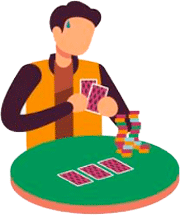As online gambling in Canada As the compulsion to gamble intensifies, so too does the likelihood of addiction. An individual with a gambling problem finds an irresistible urge to engage in online gambling, frequent casinos, and place bets on sporting events. These individuals often lose control over their actions, continuing down a harmful trajectory despite facing severe repercussions in their personal life. This discussion highlights four compelling insights into gambling addiction and recovery.
Four Captivating Insights into Gambling Addiction and Recovery
1. Problem Gambling is Classified as a Behavioral Addiction
Experts in mental health and research have recognized problem gambling as a form of behavioral addiction. ambling addicts show similar changes in behavior and brain activity as drug users and alcoholics. Defective brain functioning may play a central role in the self-destructive behavior of problem gamblers.
ambling addicts show similar changes in behavior and brain activity as drug users and alcoholics. Defective brain functioning may play a central role in the self-destructive behavior of problem gamblers.
Development of Gambling Addiction
With increased gambling activity, the strength of the addiction tends to escalate. Research utilizing brain imaging has shown that gambling triggers the brain's reward pathways, producing feelings of pleasure that are akin to those experienced by drug users.
Additionally, studies indicate that individuals with a family history of substance abuse issues are at a heightened risk for developing similar addictions themselves.
Impaired Brain Function
The prefrontal cortex of the brain, which is responsible for managing impulsivity, cognitive ability, and decision-making, has been found to be less active in those who struggle with gambling or substance addictions compared to those without such problems. Such individuals often exhibit impulsive behaviors, making it challenging for them to regulate their impulses due to this impaired brain function.
Furthermore, addicts tend to misinterpret the concepts of risk and reward and often fail to differentiate between immediate and long-term consequences.
Gambling Often Serves as a Coping Strategy
For many individuals battling addiction, it’s common to also encounter mood disorders like depression and anxiety, which can result in negative self-perceptions. Consequently, gambling may become a means of escapism from everyday difficulties, resulting in increased levels of anxiety.
2. Behavioral Therapy Can Support Those Struggling with Gambling Addiction
 Treatment approaches are similar to those used for drug and alcohol addicts. Cognitive and behavioral treatments can help problem gamblers understand the need to change their thinking about gambling. Therapy encourages them to reevaluate risky thinking, such as predicting the outcome of their next bet based on previous successes.
Treatment approaches are similar to those used for drug and alcohol addicts. Cognitive and behavioral treatments can help problem gamblers understand the need to change their thinking about gambling. Therapy encourages them to reevaluate risky thinking, such as predicting the outcome of their next bet based on previous successes.
Behavioral therapy promotes changes in one’s actions and surroundings to reduce opportunities for gambling. For instance, restricting access to cash can prove beneficial. Moreover, motivation plays a crucial role in successfully addressing gambling problems. Techniques designed to enhance motivation assist individuals in recognizing the impact gambling has on their lives and in navigating their complex feelings about quitting.
3. Many Gambling Addicts Are Women
 The number of female gambling addicts is increasing and, in some age groups, even surpasses men. Treatment should consider that women get addicted to gambling for different reasons than men.
The number of female gambling addicts is increasing and, in some age groups, even surpasses men. Treatment should consider that women get addicted to gambling for different reasons than men.
- Major life changes, such as major transitions or the end of significant relationships, can act as catalysts for women to develop compulsive gambling behaviors.
- For many women, the motivation to gamble often stems from a desire to escape challenging situations rather than a focus on winning money.
- Women generally begin gambling at an older age compared to men, but they are likely to develop problems more rapidly.
- Research suggests that women may be more responsive to gambling triggers and advertisements than their male counterparts.
- The demographic of women seeking assistance for gambling addiction predominantly falls within the age bracket of 40 to 60 years.
Female gambling addicts tend to experience higher rates of mood disorders and often have a history of experiencing physical abuse.
4. Preventing the Problem
While treatments and cessation are typically the emphasis for gambling addicts, what if we could focus on prevention from the outset? To avert potential gambling issues, individuals should be encouraged to consider the following steps:

Set a Money Limit
When planning a visit to a physical casino, it’s advisable to leave credit and debit cards at home and only carry a predetermined sum of cash. Additionally, setting a financial limit for online gambling is essential. Determine a specific amount you are willing to spend for an evening of entertainment and adhere strictly to that budget. Establish a cap; this represents the balance you'd be comfortable walking away with if you find yourself winning.

Know the Game to Control Your Bets
Acquiring an understanding of the games is crucial to managing bet sizes effectively, even if you cannot influence the game's outcome. Slot machines, for instance, allow betting on multiple lines, which may lead to wagers exceeding one’s intentions and quickly depleting funds. This scenario could tempt individuals to withdraw more money to continue playing.

Set a Time Limit
Set a phone reminder for when you plan to cease gambling or exit the physical location.

Focus on Entertainment
Anticipate utilizing the entire budgeted amount as this mindset helps maintain the perspective that gambling is purely for entertainment. This can reduce the temptation to chase losses by playing additional rounds.

Understand the Games Are Random
Tracking prior results is unlikely to aid in securing a win, as outcomes for slot machines are determined by a random number generator (RNG) computer chip.
Final Thoughts
While gambling can function as a harmless entertainment option, it may also be misused to cope with everyday stresses, similar to substances like alcohol or drugs. It’s vital to remain educated and make informed decisions. Researching responsible gaming resources can direct you to reliable platforms that prioritize player safety. If you sense that gambling is adversely affecting your life, reach out to a local helpline specializing in gambling-related issues for support. online casino ratings Playtech's Responsible Gambling Report: New Insights for Consumers in Latin America











